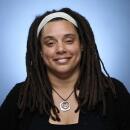‘Westworld’ stars explain how the series confronts contemporary issues of human nature and the fembot
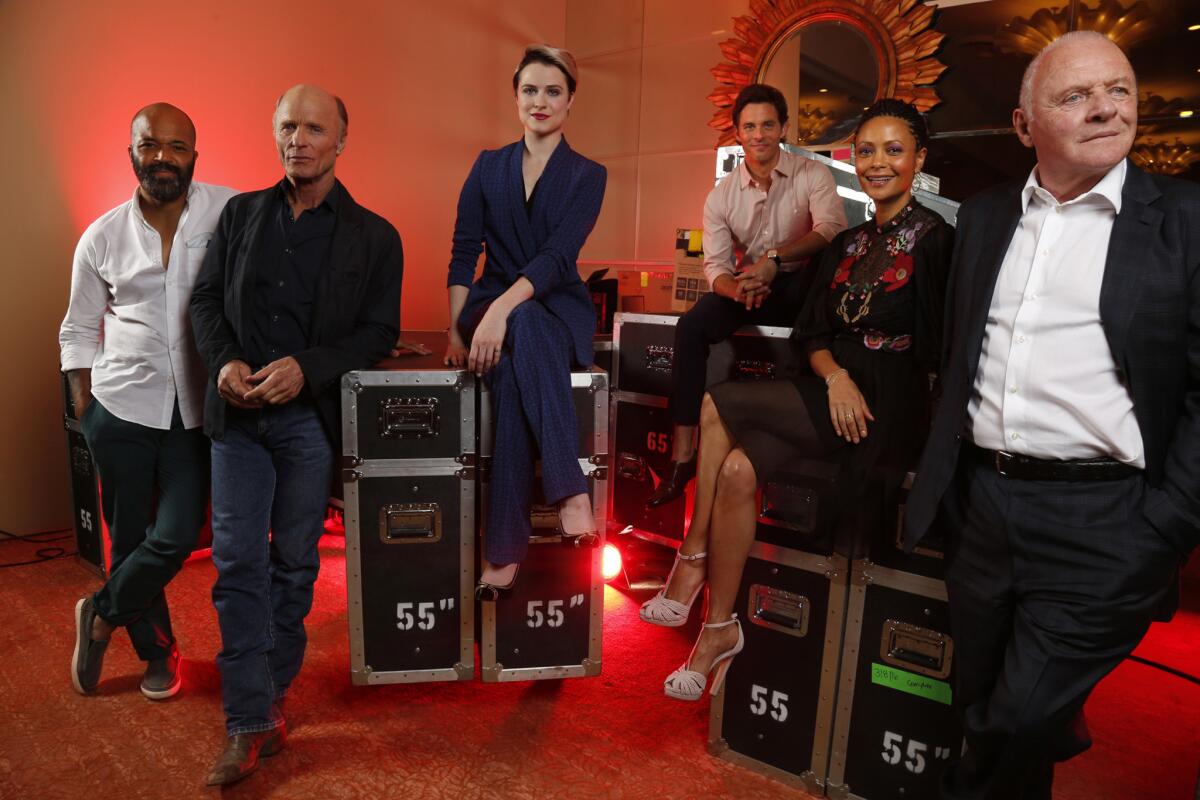
Ask straight questions of the creators and cast of “Westworld” and you may not get straight answers.
When does “Westworld” take place? Where in the world — or beyond it — is this weird, adult amusement park where humanoid robots cater to all whims and fantasies of visiting guests, located? Are you real?
Executive producers Jonah Nolan and Lisa Joy, who envisioned the seductive and scary HBO update of the 1973 Michael Crichton film, and the all-star ensemble of actors who populate “Westworld” aren’t ready to talk specifics ahead of the series’ Oct. 2 premiere. (Some won’t even cop to whether they are humans or “hosts,” the show’s nom de robot).
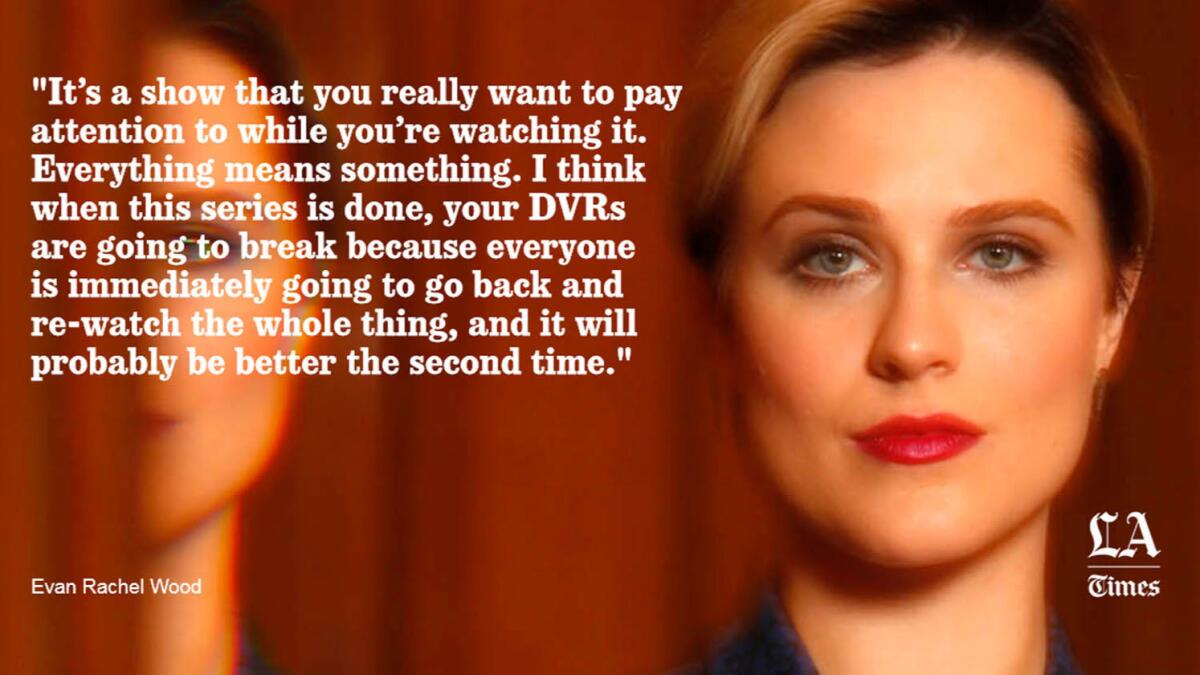
But ask them how “Westworld” reflects, or could even change, the world we live in, and the players can go on at length.
“The movie was way ahead of its time and Crichton’s mind was light years ahead of the reality,” says Jeffrey Wright, who plays Bernard Lowe, the head of Westworld’s programming division. “We’ve finally begun to catch up a bit, so there are even greater resonances and implications now and I think Jonah and Lisa are exploring in ways that simply weren’t as topical in 1973.
“But at the same time the issues of the technology marry very well with human ideas and curiosity about the nature of things and what is it that our sentience is comprised of.”
Equally as ambitious as another HBO program — the one about warring kingdoms and dragons — “Westworld” is a high-concept series with high hopes to be more than a show about rich people having sex with robots. As such, it’s impossible to discuss “Westworld” without pondering its broader themes of consciousness, consent, artificial intelligence and the nature of sin.
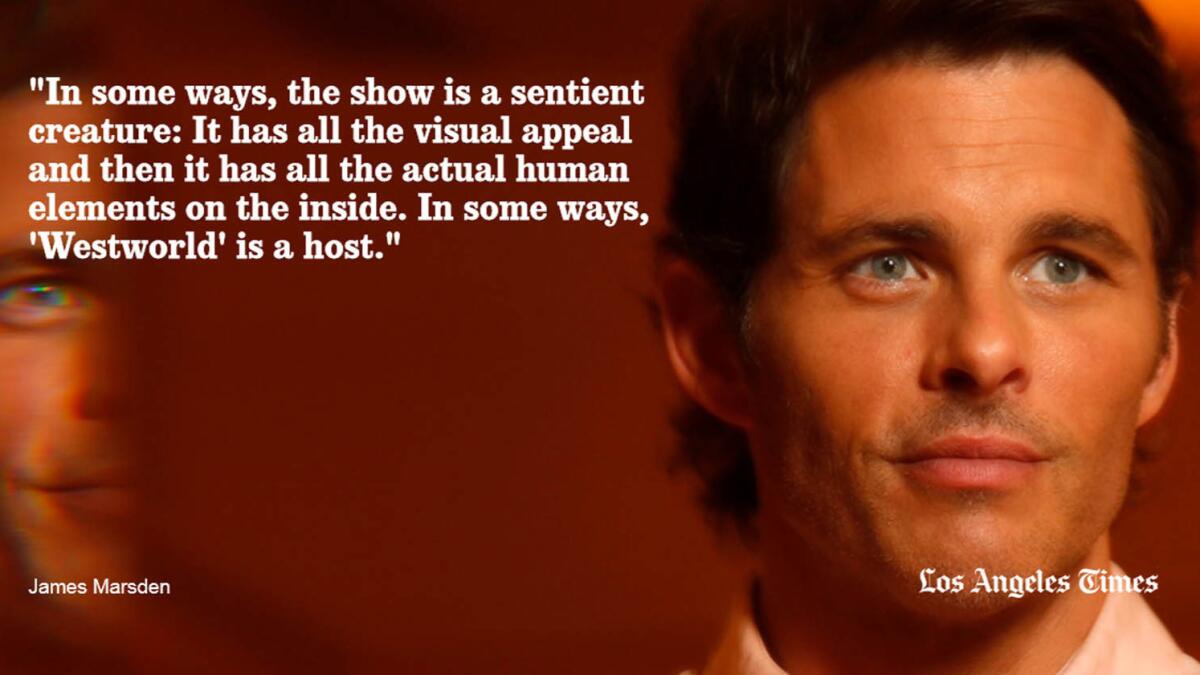
The similarities between the original film and the new 10-episode series basically begin and end with the premise: Guests pay handsomely to live out their fantasies in the Wild West bacchanalia populated by “hosts.”
Gone are scientists in wrinkled lab coats fretting from their control room of whirling tape decks. The new face of this operation is a smartly suited Anthony Hopkins as the reclusive Dr. Robert Ford, creator of the hosts and father of Westworld. His vision is served by an army of engineers and a vast corporate structure that includes everything from cleanup crews to a Westworld artistic director of sorts who scripts, styles, plans and pitches every single host character and story line and guest interaction for Ford’s approval.
The vintage robots of yesteryear have been shelved in favor of hosts who are nearly indistinguishable from humans. Grown in milky vats, their muscles genetically grafted strand by strand, they can drink, stutter, sweat, cough, bleed and “die.” Splayed out like Leonardo da Vinci’s “Vitruvian Man,” the hosts are treated more like props than works of art, as evidenced in the first footage with outed-host Dolores, played by actress Evan Rachel Wood.
Your weekly guide to fall TV »
But the showrunners behind the scenes know she’s much more than a generic “fembot.” Just mentioning the sci-fi trope to Joy, former writer for “Pushing Daisies” and co-producer on “Burn Notice,” causes the co-creator to pause and ponder. (But not before pointing out that “Westworld” employs manbots as well; it’s an equal-opportunity amusement park.)
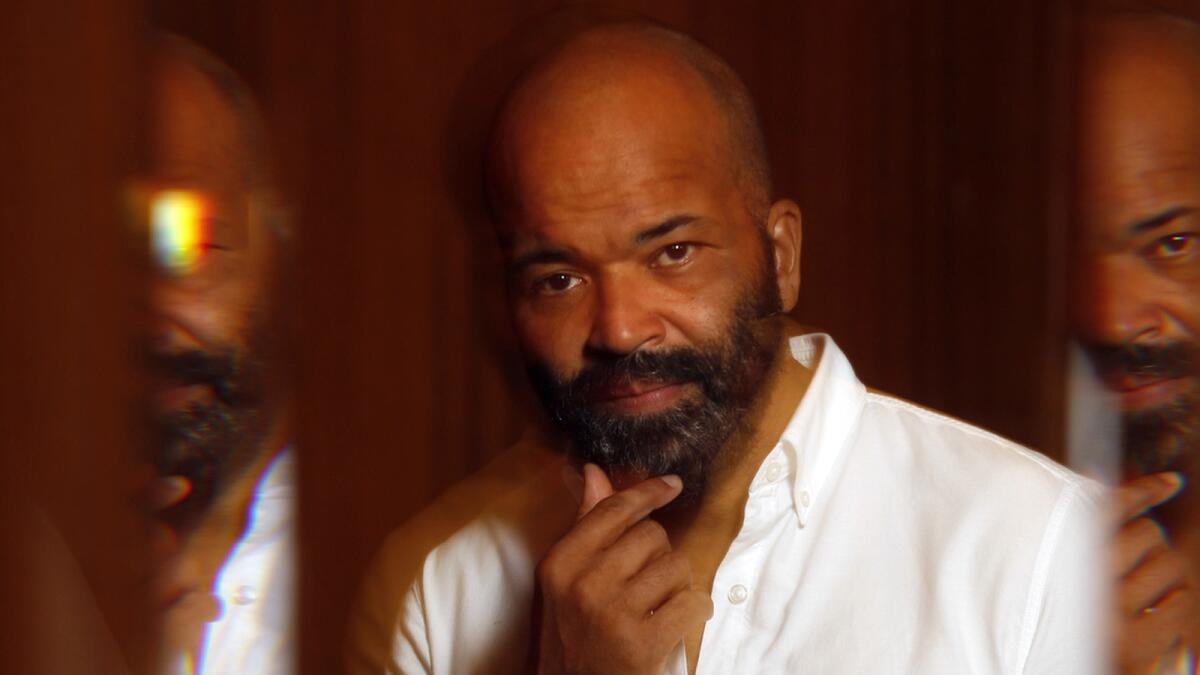
“He’s very much for the audience a Sherlock Holmes in all of this in trying to discern all of the drivers behind the mystery of the unraveling of this place.”
— Jeffrey Wright
“I think it goes back to the notion of romantic love, from the earliest myths, from Pygmalion and Galatea,” Joy says of what the guests are seeking. “You fall in love with this inanimate creature that you imbue with all your hopes and dreams.
“Oftentimes it’s narcissism, because you just want to see yourself in their eyes as something wonderful,” she continues. “And that’s what a lot of these guests are doing. They come to feel love, to feel special.… I think that there is something enduring about that desire to be loved, unconditionally. It’s an unnatural thing. Another human can’t supply that because humans aren’t made to service each other’s fantasies. So they imagine a world in which a robot would do it. We take that a step further with their own personhood and things get a little complicated.”
Indeed, at the start of the series the park is undergoing a crisis after a “glitch” in the hosts appears to be giving them sentience.
That glimpse of humanity begins to unravel the world and its players and opens up ethical questions — those questions are why many of the cast members signed on. Though “Westworld” is definitely a shiny, sci-fi artifact with all of the visual trappings, that it is also more than that intrigues the actors.
“That has to be the core of any successful artistic endeavor,” says James Marsden, who plays cowboy Teddy Flood. “There has to be that human element to the whole thing. If it’s just ornamental spectacle, you’ll start to see how hollow it is.”
Nolan and Joy endeavored mightily to make “Westworld” meaty at its core, going as far as halting production for a few months to tinker with scripts to get them just right, not unlike Ford and Lowe with their hosts.
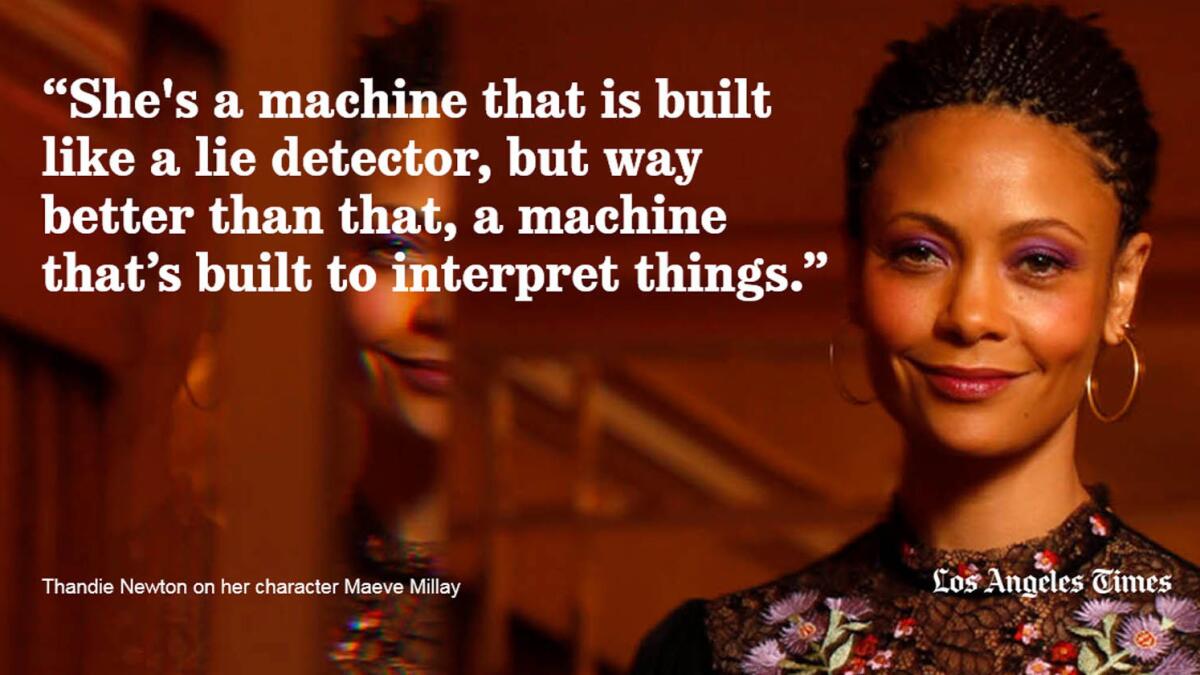
Both co-creators stress that by building this implausible pleasure island for adults, they’re hoping it will force the audience to ask larger questions of themselves.
“Part of what the show is asking is, ‘Why are we so … up?’” Nolan says. “We’re dealing with human nature from two perspectives. One, from the perspective of humans who have been ushered into a space that operates under the Vegas principle of, ‘What happens in Westworld stays in Westworld.’ Which is a catchy slogan but a truly evil idea.
“It’s an invitation to transgress. It’s an invitation to come and do something you wouldn’t do back at home. It’s a really odd idea. The other lens is [on the] creatures who have been built to be near human, and then put inside a place built to satisfy human appetites in a prophylactic way. Where no one’s getting hurt, right? Because the creatures aren’t really real.”
But since they are programmed to feel “real,” an early screening caused a ripple among reporters at the Television Critics Assn. summer press tour. The episode revealed a major plot point in “Westworld” that hinged on the sexual assault of a female character. Deemed inappropriate after the audience uproar over the prevalent scenes of sexual violence in Season 5 of “Game of Thrones,” reporters asked the new president of programming, Casey Bloys, three separate times to address the premium cable network’s depiction of violence toward women during his executive panel. His answers were vague.
Nolan and Joy’s were not.
“We weren’t interested in fetishizing the act itself,” Nolan says.
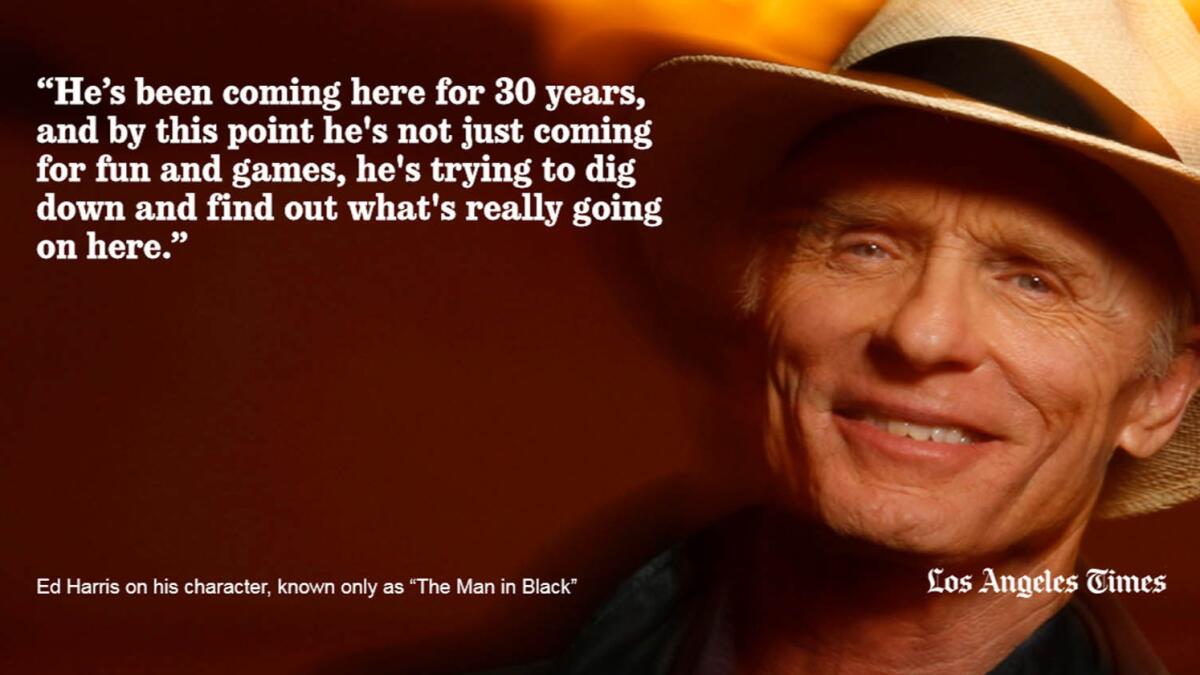
“I think part of the way you tackle [violence toward women] is by addressing it,” Joy says. “By acknowledging, this happens and it’s horrifying. When I see that scene, even though we don’t depict the assault itself, it’s horrifying. It’s hard to watch and it should be because it’s terrible and because it really happens and it happens a lot. In any examination of human nature, it’s good parts and it’s bad parts. You have to acknowledge that this is a fact it happens and so often it’s treated as if it doesn’t happen when it does happen. I think that not acknowledging it is a real danger.”
Thandie Newton, who fights for women’s rights in her private life, is hopeful about the potential conversations around the show and her character Maeve. “This is one of those big, bombastic statements, that I don’t want to turn people off, but I really think it’s part of the solution when it comes to violence against women, when it comes to gender equality,” she says. “This was the first time in my life I was able to do the work that I do as an activist through the role.”
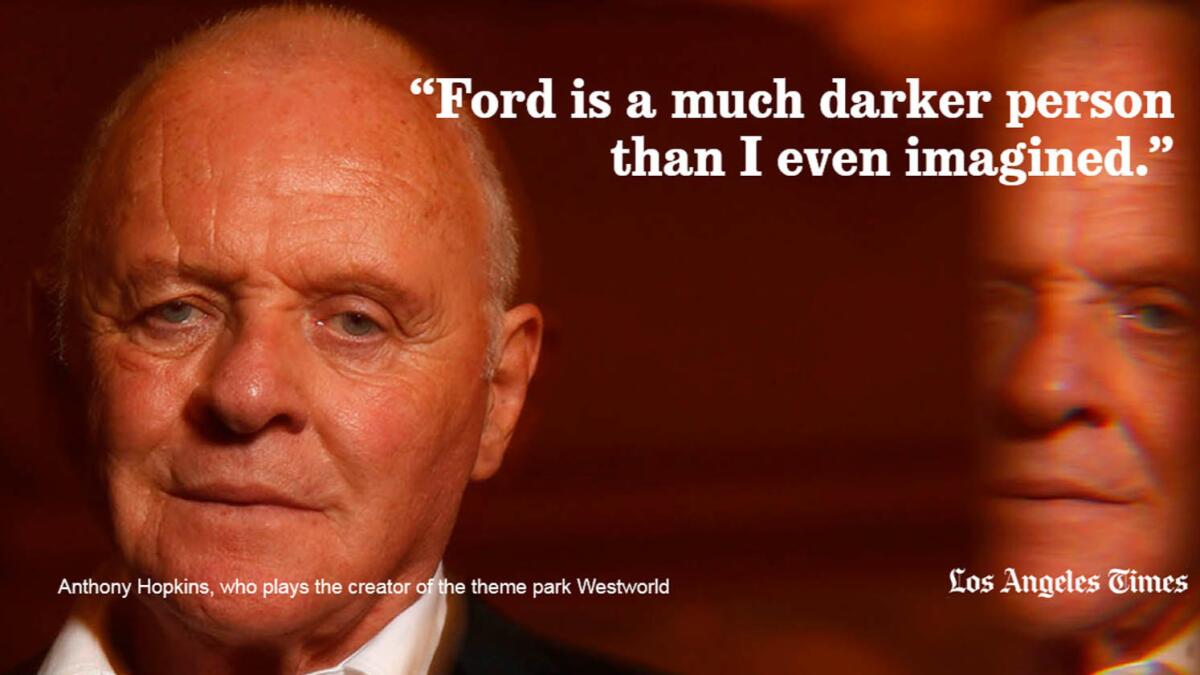
“It’s going to be a hard look in the mirror,” Wood warns of the show. “But I think you will also see the potential that we possess. We’re not at Westworld yet, it could be a cautionary tale.”
“It’s definitely provocative,” sums up Ed Harris, who plays the mysterious, and not very nice Man in Black, a guest who has been visiting the park for 30 years. “I’ll be real interested to see how it’s received. Not so much critically, but audience-wise, if people get into it or not. I think they will.”
Given the nature of today’s instant-feedback culture, no doubt all involved with “Westworld” will have an answer straight away.
MORE:
Anthony Hopkins delights in his ‘dark, mysterious’ character in ‘Westworld’
‘Westworld’ creators on love, violence and human nature
Fall’s familiar faces and TV newcomers
More to Read
The complete guide to home viewing
Get Screen Gab for everything about the TV shows and streaming movies everyone’s talking about.
You may occasionally receive promotional content from the Los Angeles Times.




